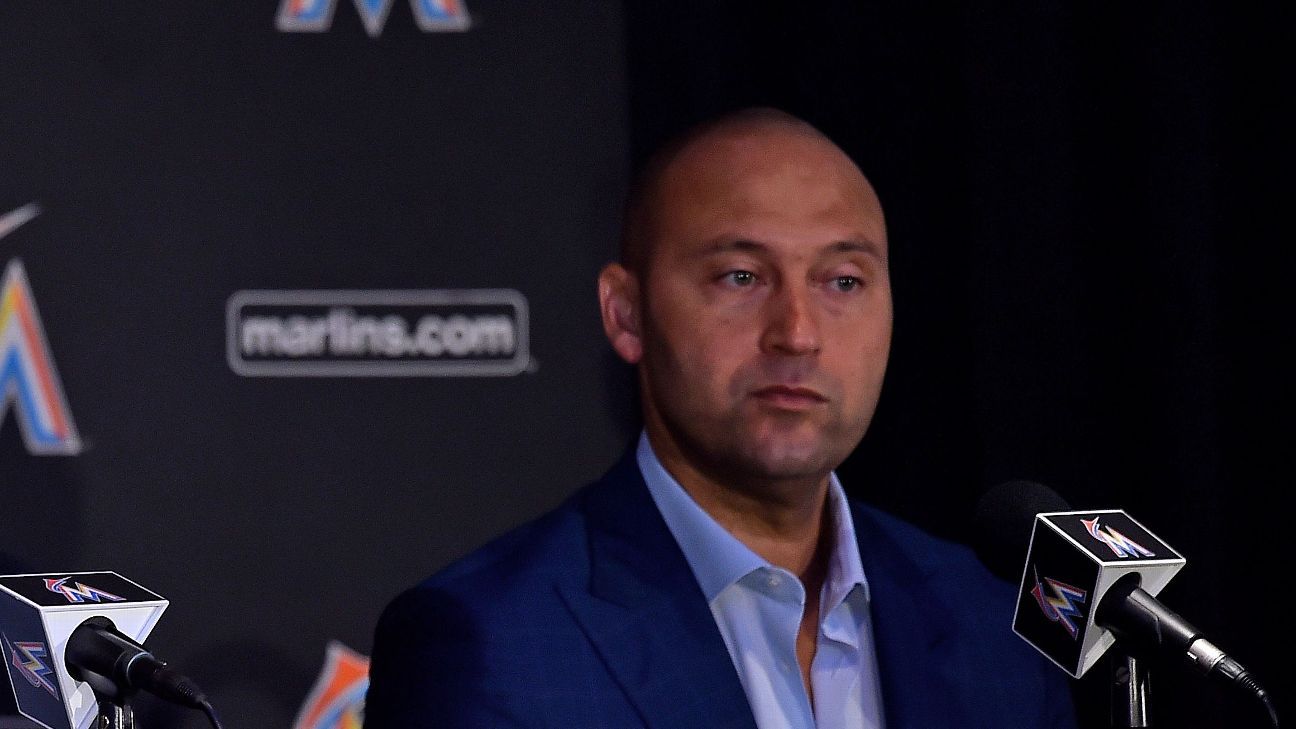Derek Jeter stepping down as Miami Marlins’ CEO, shareholder

Derek Jeter announced Monday that he has stepped down as CEO of the Miami Marlins, a decision that sent shockwaves through the industry on the day of Major League Baseball’s self-imposed deadline to finalize a new collective bargaining agreement and preserve the start of the regular season.
In a statement sent through a news-release distributor rather than the Marlins, Jeter said “the vision for the future of the franchise is different than the one I signed up to lead. Now is the right time for me to step aside as a new season begins.”
Jeter, the Hall of Fame shortstop who enjoyed an illustrious 20-year career with the New York Yankees, joined the Bruce Sherman-led group that purchased the Marlins from Jeffrey Loria for $1.2 billion in September 2017. Jeter was given only a stake of only 4% in the franchise — a stake he will now give up — but was tasked with running business and baseball operations.
In four full seasons under Jeter, the Marlins went a combined 218-327 but surprisingly made the postseason during the COVID-19-shortened 2020 season. The beginning of Jeter’s tenure included the trades of high-priced players such as Giancarlo Stanton, Christian Yelich, J.T. Realmuto and Marcell Ozuna, but it eventually saw the development of players like Sandy Alcantara, Jazz Chisholm, Jesus Sanchez and Lewin Diaz. Earlier this month, ESPN’s Kiley McDaniel ranked the Marlins’ system fourth among the 30 organizations.
Under Jeter, the Marlins secured a naming rights deal and a new TV contract, introduced new uniforms and hired Kim Ng, the first woman general manager in MLB. The team lost 95 games in 2021 but bolstered its offense prior to the Dec. 1 lockout, signing Avisail Garcia and trading for Joey Wendle.
In the end, sources said, Sherman and Jeter came at odds over the size of his ownership share and the financial commitment to the roster. Jeter, 47, was entering the final season of a five-year contract. Sherman’s statement alluded to Jeter stepping down as a mutually-agreed-upon decision.
Ng will run baseball operations and COO Caroline O’Connor will manage day-to-day business operations while the team searches for a new CEO.
In a statement, Sherman thanked Jeter and wrote that the Marlins “have a deep bench of talent that will oversee both business and baseball decisions while we work to identify a new CEO to lead our franchise. The ownership group is committed to keep investing in the future of the franchise — and we are determined to build a team that will return to the postseason and excite Marlins fans and the local community.”
Jeter’s departure seemingly leaves the status of Gary Denbo in question. Denbo, the Marlins’ vice president of player development and scouting, was leaned on heavily by Jeter and is one of several former Yankees in the organization who might now choose to go elsewhere.
Jeter was a five-time World Series champion on Yankees teams that were annually among the sport’s biggest spenders. He had previously admitted to being innately impatient while overseeing a franchise with shallower pockets and shorter contention windows. The Marlins’ payrolls ranked within the sport’s bottom four at the start of each of the last three seasons.
This offseason brought signs of a potential shift. Garcia was given a $56 million contract; Alcantara and Rojas were extended on deals that combined for $66 million. But apparently the spending wouldn’t go much further, a theme that has persisted throughout the 29-year history of a Marlins organization that has consistently struggled to draw fans.
MLB commissioner Rob Manfred praised Jeter in a statement, calling him “a winner on and off the field” and “a pillar of our game.”
“We had a vision five years ago to turn the Marlins franchise around, and as CEO, I have been proud to put my name and reputation on the line to make our plan a reality,” Jeter wrote in his statement. “Through hard work, trust and accountability, we transformed every aspect of the franchise, reshaping the workforce and developing a long-term strategic plan for success.”
ESPN’s Buster Olney contributed to this report.


